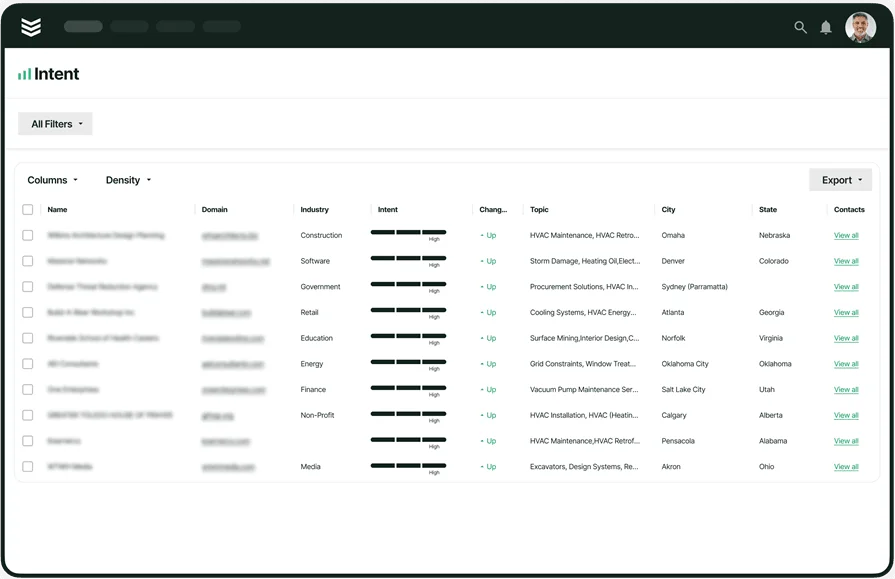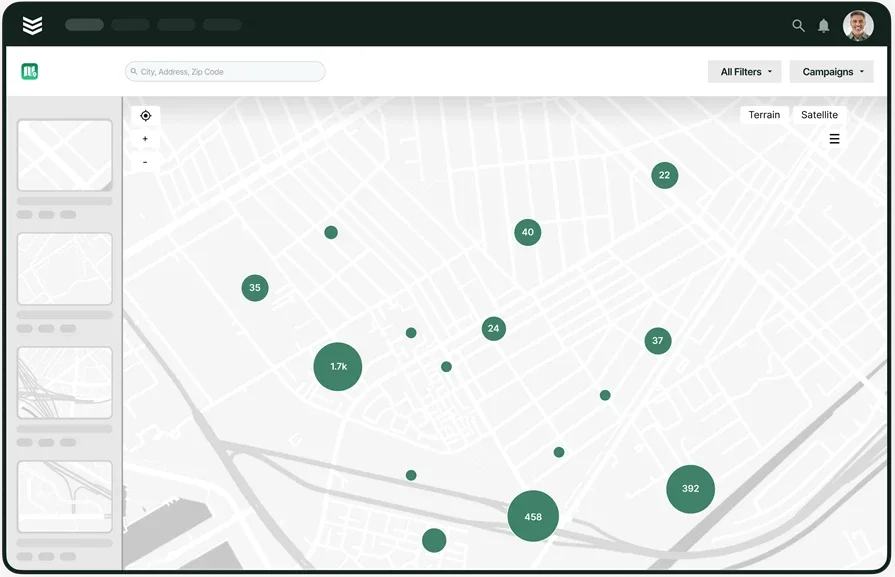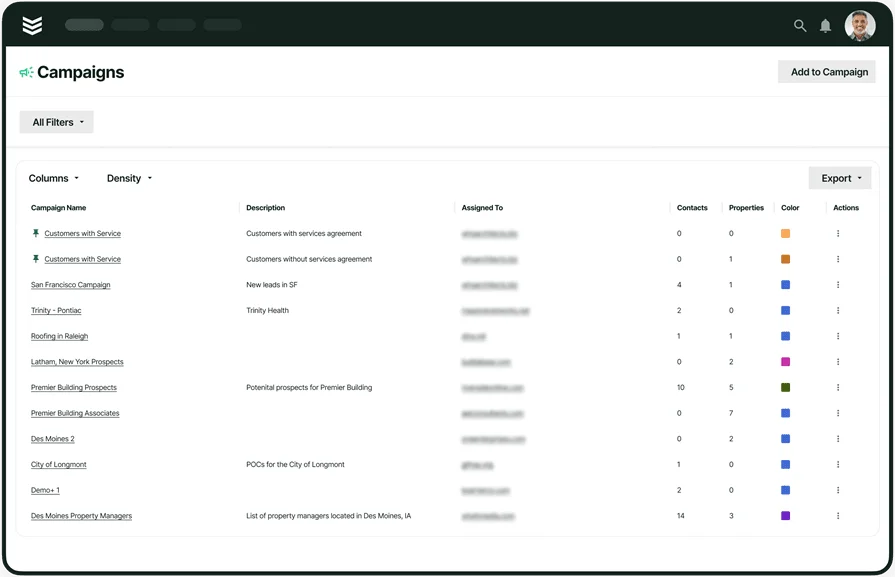A good field service CRM keeps your team organized, improves response times, and simplifies everything from scheduling to invoicing. The challenge is finding one that fits your workflow, integrates with your existing tools, and actually makes day-to-day operations easier.
This guide will break down what to look for, must-have features, and the best options for contractors across industries. Whether you manage commercial operations or residential jobs, we’ll help you choose a CRM that keeps your team on track and your customers happy.
- Choosing the right field service CRM software for your needs
- 7 key features to look for in field service CRM software
- Best field service CRM software for commercial contractors
- Best field service CRM software for residential
- Best field service CRM software for general contractors
- Other notable CRM field service software providers
- 6 benefits of using CMR for field service
- 5 important field service CRM software FAQs answered
Now that we’ve set the stage, let’s dive into how to choose the right field service CRM software for your business. What factors should you consider, and how can you ensure your investment pays off in the long run? Let’s start with the essentials.
Choosing the right field service CRM software for your needs
Whether you're struggling with scheduling, communication, or scaling your operations, the right CRM can transform how your team works while out in the field. But to find the right fit, you need to evaluate your pain points, growth plans, and the software’s ability to integrate seamlessly into your daily operations.
- Identify Your Pain Points: What challenges is your team facing? Are scheduling inefficiencies, poor communication, or disorganized customer records slowing you down? Pinpointing these issues will guide you toward the right solution.
- Evaluate Scalability: Can the software grow with your business? Look for tools that support your current operations and can handle more technicians, customers, and jobs as your company expands.
- Check Integration Capabilities: Will the CRM work seamlessly with your existing tools, such as accounting or dispatch software? Integration is key to simplifying your workflow instead of complicating it.
- Consider Support and Training: Does the provider offer the resources you need to get started and troubleshoot? Onboarding and responsive customer service are crucial when adopting new technology.
- Focus on Features: Ultimately, the CRM’s features should directly address your team’s needs. Whether it’s real-time dispatching, route optimization, or centralized customer management, make sure the tool delivers solutions that matter most to your business.
With your needs and priorities in mind, the next step is to dig into the features that make a field service CRM software truly effective. Not all tools are built the same, so let’s explore the key functionalities that can help your team work smarter and deliver better results.
7 key features to look for in field service CRM software
The right field service CRM software can elevate how your team operates, cutting down on manual tasks and improving overall efficiency. It should tackle common challenges like scheduling, communication, and data management while providing tools that streamline workflows. Here are the essential features to prioritize when evaluating your options.
1. Automated scheduling and dispatching
Efficient scheduling and dispatching are critical for field service teams managing multiple jobs daily. Automated tools account for technician availability, job priority, and location, ensuring every assignment is handled promptly. These features reduce errors, eliminate double-booking, and improve response times—helping you keep your field service operations running smoothly.
2. Customer portal
Customer portals enhance transparency by allowing clients to access service updates, job histories, and invoices on demand. They also enable customers to schedule appointments or approve estimates without calling your office, reducing admin work and keeping your team focused on the job.
3. Mobile access for technicians
Field service technicians are constantly on the move, making real-time mobile access crucial. A field service CRM with a mobile app ensures your team can instantly view job details, update work statuses, and log important notes from their smartphones or tablets. This eliminates unnecessary trips back to the office and keeps your team efficient in the field.
Learn more about how mobile field service app keeps field teams connected in our guide to field service management platforms.
4. Work order and inventory management
Managing work orders and tracking inventory in real-time is a game-changer for field service teams. Technicians need immediate access to job details and the right parts to complete tasks efficiently. A field service CRM helps avoid wasted trips, improves job completion rates, and ensures nothing falls through the cracks.
5. Payment gateway integration
Integrated payment systems allow for seamless invoicing and payment collection directly through the CRM. This feature speeds up cash flow and reduces the administrative burden of managing payments manually. Ultimately, this ensures you get paid faster and more reliably.
6. Reporting & analytics
Access to detailed analytics and customizable dashboards is essential for tracking performance and making informed decisions. Features like job completion metrics, technician productivity, and customer satisfaction scores provide actionable insights that enable your team to refine processes and optimize your productivity.
7. Security and compliance
Field service businesses handle sensitive customer data daily. A robust CRM with encryption, role-based access, and compliance tools ensures your information stays secure while meeting industry regulations. Keeping data protected isn’t just about security—it’s about maintaining customer trust.

Explore our CRM product
See how we help field service teams organize customers and track job progress.
Other valuable features for CRM field service software
- Alerts and Notifications - Real-time alerts keep your team informed about schedule changes, urgent tasks, or job updates. This feature ensures everyone stays on the same page, reducing miscommunication and delays. Notifications can also be sent to customers, improving transparency and overall satisfaction.
- Service History Tracking - Accessing a complete service history for each client helps technicians understand past issues and prepare for upcoming jobs. This feature ensures more consistent service, speeds up troubleshooting, and builds trust with customers by showing that you know their unique needs.
- Customizable Workflows - Every business operates differently, so having a CRM that allows for customized workflows ensures the tool adapts to your processes—not the other way around. Tailored workflows can improve efficiency and eliminate unnecessary steps in your day-to-day operations.
Best field service CRM software for commercial contractors: BuildOps
BuildOps is purpose-built for commercial contractors, offering a robust suite of tools that streamline operations while addressing industry-specific needs. From intuitive scheduling to comprehensive customer management, BuildOps stands out as a powerful solution for large-scale field service teams.
How Pricing Works: To assist you in exploring features and identifying a solution that meets your needs, we provide weekly live demos as well as the opportunity to schedule a customized session.
Features Beyond CRM:
- Real-time dispatching with route optimization
- Centralized customer information, including service histories and asset details
- Integrated reporting and dashboards for actionable insights
- Mobile access for technicians to update jobs on the go
What Sets It Apart for Commercial: BuildOps excels in handling the complexity of commercial field service operations. Its ability to manage multiple properties, contacts, and large-scale projects makes it an ideal choice for contractors who need scalability and precision.

See BuildOps in action.
We help contractors manage their client lists and keep field crews on task.
Best field service CRM software for residential: Jobber
Image Source: Jobber
Jobber is designed with small to medium-sized residential service businesses in mind. It offers straightforward tools for scheduling, invoicing, and customer management, making it a reliable choice for homeowners and small-scale projects. However, it may not be the best fit for larger commercial operations that require more advanced features like multi-property management or complex reporting.
How Pricing Works: Jobber offers tiered pricing, with higher-tier plans unlocking advanced features like automation and client portals.
Features Beyond CRM:
- Scheduling and dispatch tools
- Mobile app for field teams
- Customer self-service portal
- Job status tracking
What Sets It Apart for Residential: Jobber’s intuitive interface and customer-facing portal simplify the process for homeowners while reducing administrative work for contractors.
Learn more about the client management features Jobber offers.
Best field service CRM software for general contractors: Tradify
Image Source: Tradify
Tradify is built for general contractors managing multiple projects and job sites. Its features cater to balancing quotes, invoices, and team coordination, offering a simple yet effective solution for broad operational needs. That said, it may not provide the depth of customization or scalability that growing commercial service businesses need to handle large teams and complex workflows.
How Pricing Works: Tradify offers a flat pricing plan per user, per month, with no hidden fees.
Features Beyond CRM:
- Quote and job management tools
- Service history tracking
- Integrated time tracking
- Customizable workflows
What Sets It Apart for General Contractors: Tradify’s comprehensive job management tools are tailored for contractors handling high volumes of projects, providing real-time visibility across all operations.
Easily receive and respond to work requests using Tradify’s customer enquiry software.
Other Notable CRM field service software providers
The market offers several CRM solutions tailored to field service businesses. While not as specialized for specific contractor types, these platforms still provide valuable tools to enhance operations.
FieldEdge: Best for small service businesses
Image Source: FieldEdge
FieldEdge simplifies service management with a focus on efficient scheduling and financial integration. It’s a solid choice for smaller service businesses that need basic CRM functionality and QuickBooks integration. However, it lacks advanced commercial features like multi-location management, in-depth reporting, and customizable workflows—key tools for scaling field service operations.
How Pricing Works: Subscription-based, per-user pricing.
Features Beyond CRM:
- Work order tracking
- QuickBooks integration
- Real-time dispatching
What Sets It Apart for Small- to Medium-Sized Businesses: Its tight QuickBooks integration streamlines financial management, making it ideal for contractors who value efficient bookkeeping.
Buildertrend: Best for construction and remodeling professionals
Image Source: Buildertrend
Buildertrend offers robust project management tools for contractors handling multiple stakeholders and complex workflows. It’s particularly useful for construction firms managing long-term projects. Although, it’s more focused on project tracking rather than real-time field service operations, making it less ideal for companies that need fast scheduling, dispatching, and service tracking.
How Pricing Works: Monthly subscription, with tiered plans based on features.
Features Beyond CRM:
- Scheduling and job management
- Collaboration tools for teams and clients
- Document sharing
What Sets It Apart for Construction and Remodeling: Its collaboration features, such as client communication and document sharing, are tailor-made for contractors managing large projects.
ServicePower: Best for advanced scheduling
Image Source: ServicePower
ServicePower focuses on AI-driven scheduling and route optimization, helping businesses maximize efficiency. It’s a great option for organizations prioritizing logistics and automation. However, its heavy emphasis on AI may not suit companies that need hands-on, customizable service management tools, especially those requiring technician-specific workflows and real-time field updates.
How Pricing Works: Customized pricing based on business needs.
Features Beyond CRM:
- AI-driven route optimization
- Contractor management tools
- Predictive analytics
What Sets It Apart for Advanced Scheduling: ServicePower’s AI capabilities provide deep insights, making it ideal for businesses that rely heavily on data-driven decisions.
Joist: Best for small contractors and tradespeople
Image Source: Joist
Joist is a lightweight tool designed for contractors who need simple yet effective solutions for estimates and invoicing. It’s best suited for independent contractors or small businesses with minimal operational complexity. But for commercial contractors managing large teams, recurring service contracts, and detailed work orders, Joist may not offer the depth of features required to keep operations running efficiently.
How Pricing Works: Free basic version with optional premium plans.
Features Beyond CRM:
- Estimate creation
- Payment processing
- Customer management
What Sets It Apart for Small Contractors: Its user-friendly design and affordability make it perfect for contractors working on smaller-scale projects.

Download the software scoresheet
Make sure you find an ideal fit for your crew with an easy-to-use software scoresheet.
6 benefits of using CRM for field service
Keeping field service operations running smoothly isn’t easy, but the right CRM brings order to the complexity. It equips your team with tools to work smarter, deliver exceptional service, and keep your business moving forward without the usual headaches.
1. Increased efficiency and productivity
CRM software automates time-consuming processes like scheduling, invoicing, and route optimization, freeing up your team to focus on core tasks. By reducing manual work, your technicians can complete more jobs in less time, boosting productivity across the board.
2. Improved customer experience
With real-time access to customer data, service history, and updates, your team can deliver personalized and timely service.
3. Reduced costs
Optimized scheduling and route planning cut down on fuel expenses and unnecessary travel. Additionally, automation reduces administrative overhead, saving you money on labor costs while minimizing errors that could result in costly delays.
4. Enhanced security and compliance
A CRM ensures sensitive customer and business data is stored securely, with built-in compliance measures to meet industry standards. Features like role-based access control protect your information while ensuring only authorized team members can access critical data.
5. Better insights and analytics
Robust reporting tools track metrics like technician performance, job completion rates, and customer satisfaction. These insights allow you to identify bottlenecks, improve processes, and make data-driven decisions that drive growth.
6. Customizable workflows
Every business is different, and a good CRM adapts to your needs. Customizable workflows let you create processes that fit your team, from managing work orders to automating follow-ups, ensuring seamless operations tailored to your business.
5 important field service CRM software FAQs answered
Field service CRM software can transform how businesses manage their operations, but there are always questions about how it works, who it’s for, and whether it’s worth the investment. Here are answers to the most common FAQs to help you decide if it’s the right fit for your team.
1. What is field service CRM software?
Field service CRM software helps businesses manage scheduling, customer relationships, work orders, and technician coordination. It centralizes data, streamlining operations and improving communication between field and office teams. Errors are reduced and tasks are completed more quickly.
2. How does field service CRM software work?
A field service CRM integrates with your workflows, automating tasks like dispatching, customer management, and invoicing. It uses real-time data to assign jobs, track progress, and ensure seamless communication between your office and field technicians.
3. Who needs field service CRM software?
Any business that relies on field teams can benefit from CRM software. This includes HVAC companies, plumbers, electricians, and general contractors. If you manage technicians, schedule jobs, or need better communication, a CRM is a must-have.
4. Is field service CRM software worth the cost?
Field service CRM software costs vary based on the number of users, level of service, and available support options. Small businesses can often find affordable entry-level plans, while larger companies may invest in premium packages that offer expanded features for handling complex tasks. The real value lies in the benefits—fewer missed opportunities, greater efficiency, and happier clients.
5. What are some best practices to follow when implementing a CRM for field service?
Before rolling out your CRM, define clear goals—whether it's improving scheduling, streamlining invoicing, or enhancing customer communication. Map out how it fits into your existing workflows, then train your team to use it effectively. Make CRM usage part of daily operations, track key performance metrics, and gather feedback to refine processes over time.
Field service CRM software can take the guesswork out of managing operations—helping you streamline tasks, improve customer satisfaction, and keep your business running efficiently. But not all tools are created equal. Many platforms leave gaps in features or aren’t designed with contractors in mind.
BuildOps stands apart by offering a complete solution tailored to the needs of commercial field service businesses. From real-time dispatching to advanced reporting and mobile access, it provides everything you need in one place to keep your team organized and productive.

See the difference for yourself
Explore how BuildOps can streamline your operations and boost profits.







